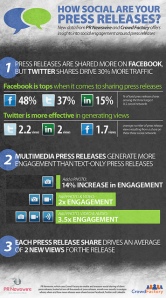 Is the traditional press release dead, and if so how will its demise affect ad agency PR?
Is the traditional press release dead, and if so how will its demise affect ad agency PR?
Recently I posed the “Is-the-press-release-dead” question to students in my strategic communications class at Williamson College. I asked them to read an article titled “The end of the press release?” — which makes this claim — and let me know their thoughts about it.
The author, Gregory Galant, concludes his article with this interesting statement: “It’s time we accept that the days of the press release are over-let’s skip the anger, bargaining, and depression stages-and focus on more effective methods for releasing news.”
What exactly those “more effective methods” are Mr. Galant doesn’t spell out, though he notes that “The SEC has even announced that information can be released via social media, provided investors know where to look and it’s not restricted.”
So why does this have to be an either/or situation? Why not use social media to extend the reach of a press release rather than replace it?
I wasn’t convinced the press release is dead, and it turns out my students didn’t buy it, either. One of them commented:
“There are plenty of people in the general public who still do not have Twitter, Facebook, Instagram, Tumblr accounts…There are other who simply don’t get that interested in social media. There will always be ‘that kind’ of public. They need other ways to find out what’s going on. Newspapers, TV news, etc., are great sources for people who either don’t use social media or who simply want to unplug from the hectic pace of pointless selfies that fill the Internet. Sometimes I like hearing about important information through social media, but usually I treat that as entertainment…There have to be lots of folks out there like me. Press releases are not dead.”
Good insights from someone who is smack dab in the middle of the generation that grew up with social media.
Mr. Galant cites four reasons the days of press releases are “long gone.” I’ll summarize and respond to each one.
1. Today, seconds after you post a press release on the Internet, it’s no longer new news.
True, but so what? How is using social media or other methods going to change that?
2. Google itself has said that it’s discounting content that you pay to distribute and has explicitly warned against putting unnatural links in press releases.
Who says everybody pays to distribute their press releases? Having updated media lists are vital for any PR person. Paid services should supplement, not totally replace, an in-house media list. And if you are going to be held hostage to Google’s constantly changing search algorithm, you’ll likely end up at the algorithm funny farm.
3. People must want to share your content with their friends and followers. A formal announcement typically isn’t well suited to these channels.
Companies make announcements through “formal” press releases all the time. If the topic is of interest, why wouldn’t people want to share it regardless of how the content is delivered?
4. The SEC has already provided the guidance that public companies can simply post announcements on their websites, rather than use a press release service.
Okay, so public companies have options – how does that prove the traditional press release is dead? As I noted earlier, why not use a press release and social media to extend your reach and let people choose how they prefer to receive information?
My student had it right. Press releases are not dead – and they’re not likely to die out anytime soon.
photo credit: PRNewswireGlobal via photopin cc